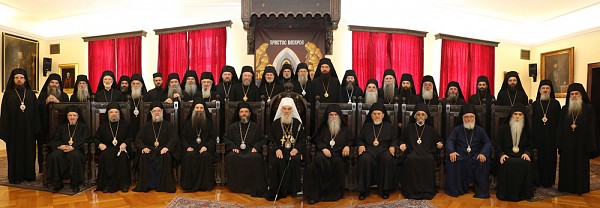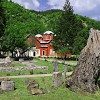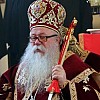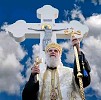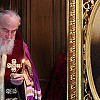Саопштење за јавност Светог Архијерејског Сабора Српске
Саопштење за јавност Светог Архијерејског Сабора Српске Првославне Цркве са редовног заседања одржаног у Пећкој Патријаршији и Београду од 29. априла до 10. маја 2018. године
Овогодишње редовно заседање Светог Архијерејског Сабора Српске Православне Цркве започето је 29. априла у манастиру Пећкој Патријаршији саборним служењем свете архијерејске Литургије и призивом Светога Духа, а настављено у Патријаршији српској у Београду, под председништвом Његове Светости Патријарха српског г. Иринеја. На заседању су учествовали сви епархијски архијереји Српске Првославне Цркве.
На почетку прве саборске седнице Патријарх се обратио присутним архијерејима уводном беседом у којој је указао на суштинска питања живота и мисије Српске Православне Цркве у савременом свету, препуном како великих духовних изазова и искушења тако и великих могућности за рад на духовној обнови народа.
Најважнија саборска одлука јесте одлука о установљавању нових празника у календару Српске Православне Цркве, што значи и у календару Православне Цркве уопште. Сабор је, наиме, једногласно одлучио да канонизује, односно приброји сабору светих, три личности, због непоколебиве верности вери Христовој убијене од Арнаута за време османлијске власти, на измаку 19. века и у освит 20. века, на Косову и Метохији, и то:
- Григорија Пећког, сабрата Пећке Патријаршије, као свештеномученика, чији ће се спомен литургијски прослављати 22. јануара/7. фебруара;
- Василија, пекара пећког, као мученика, чији ће се празник славити 29. априла/12. маја,
- Босиљку Рајичић из села Пасјана код Гњилана као мученицу, чији подвиг ће се празновати 13/26. октобра,
- и остале са њима пострадале.
Чином свечаног литургијског прослављења и јавног проглашавања ових светих мученика из нашега рода Сабор је и крунисао свој рад, у Храму Светог Саве на Врачару, на дан спаљивања његових светих моштију, 10. маја текуће године. За време заседања Сабора у Пећкој Патријаршији саборски оци су посетили манастире Високе Дечане и Свете Враче у Зочишту код Ораховца и српско село Велику Хочу у истом крају.
По саслушању извештаја о току припремâ за прославу 800-годишњице самосталности (аутокефалије) Српске Православне Цркве, која ће означити 2019. и 2020. годину, Сабор је одлучио да у току ове године молитвено и достојанствено обележи и хиљадугодишњицу оснивања Охридске Архиепископије. Сабор такође са радошћу поздравља најаву доношења, у ближој будућности, Часног Појаса Пресвете Богородице, који се чува у манастиру Ватопеду на Светој Гори, и чудотворних моштију светог Луке, лекара, архиепископа симферопољског (Крим) и исповедника вере у совјетској Русији, како би се наш верни народ могао поклонити тим великим светињама. Сабор такође поздравља правоснажну одлуку Великог савета Европског суда за људска права у Стразбуру којом се констатује да су власти Бивше Југословенске Републике Македоније прекршиле међународну конвенцију о људским правима и слободи вере и савести одбијајући да региструју канонску Охридску Архиепископију.
Сабор се упознао са садржајем извештајâ о радовима на осликавању и украшавању Спомен-храма Светог Саве на Врачару, о црквеној просвети, о раду Светог Синода, Патријаршијског управног одбора, Фондације за Косово и Метохију, Добротоворне фондације Српске Православне Цркве „Човекољубље”, Поклоничке агенције „Доброчинство”, Информативне службе Српске Православне Цркве, саборског Одбора за Јасеновац и Верске службе у Војсци Србије и у Оружаним снагама Босне и Херцеговине, као и са садржајем извештајâ епархијских архијереја о њиховом архипастирском раду. На основу свих тих извештаја донете су одговарајуће одлуке. Општа је констатација Сабора да је све више проблема по епархијама: драстично се смањује број становникâ у сеоским срединама, па тако и број верникâ; бела куга хара свугде тако да нам прети демографска катастрофа; албански екстремисти и даље, све провокативније, делују не само на Косову и Метохији него и у Епархији врањској (Прешево); румунски пропагандисти интензивирају своје деловање против канонског поретка Цркве у епархијама тимочкој и браничевској, а то чине у оквиру етнофилетистичког и политичког пројекта румунизације влашког и влахојезичног дела становништва Источне Србије; на сличан начин поступају и извесни бугарски кругови у Епархији врањској (Босиљград). Особито је алармантно стање у Црној Гори, где државни апарат води дискриминаторску кампању против законите Митрополије црногорско-приморске и Епархије будимљанско-никшићке, фаворизује безначајну („црногорску”!) сектицу Мираша Дедеића, при чему истовремено врши стални притисак на српски народ покушавајући да му наметне црногорство као национални идентитет.
Сабор са задовољством истиче да су односи Српске Православне Цркве са сестринским Православним Црквама беспрекорни, у духу јединства и љубави, уз жалосни изузетак понашања Румунске Православне Цркве, са којом смо све до недавне прошлости били једно по Богу, и бесмислене иницијативе Бугарске Патријаршије да се незвано и неканонски умеша у питање решавања статуса расколничке „Македонске Православне Цркве”. У овом контесту, Сабор изражава своју пуну солидарност, у састрадалној братској љубави, са мученичком сестринском Црквом у Украјини, изложеном најгрубљем гоњењу од стране садашњег режима у Кијеву.
Сабор је размотрио приспеле предлоге, примедбе и допуне на нацрт новог Устава Српске Православне Цркве и одлучио да све архијереје умоли да Светом Синоду доставе своја запажања о том нацрту најкасније до 1. новембра текуће године како би их саборска Комисија за Устав размотрила и како би Сабор идуће године могао да се изјасни на ту тему.
Констатовано је такође да су односи са Римокатоличком Црквом, Црквама Реформације и екуменским организацијама коректни и конструктивни, што, нажалост, не важи за односе са Хрватском бискупском конференцијом, у којој, поред добронамерних бискупа који делују у духу Другог ватиканског сабора, постоји, нажалост, и добар број бискупâ неприкривене проусташке оријентације и усташоидне реторике. Сабор се нада да ће они први извршити већи утицај на хрватске римокатоличке вернике него ови други.
Сабор је посебну пажњу посветио светињи брака и породице и потврдио своју прошлогодишњу одлуку о оснивању посебног одбора при Светом Синоду који ће се бавити том проблематиком, као и одбора за биоетику и екологију.
Свог угледног члана, Епископа бањалучког Јефрема, Сабор је одликовао орденом Светог краља Милутина.
За односе Цркве са Војском Србије, нарочито по питању верске службе у војсци, уместо Епископа шумадијског Јована изабран је Епископ тимочки Иларион.
Сабор је попунио упражњене епархије. За Епископа франкфуртског и све Немачке изабран је досадашњи Епископ захумско-херцеговачки Григорије; за Епископа захумско-херцеговачког јеромонах Димитрије (Рађеновић), настојатељ манастира Дужи; за Епископа осечкопољског и барањског игуман Херувим (Ђермановић), настојатељ манастира Даљска Водица; за Епископа буеносајреског и јужноцентралноамеричког епископ Кирило (Бојовић), досадашњи викарни епископ диоклијски; за викара Његове Светости Патријарха архимандрит Стефан (Шарић), настојатељ Храма Светог Саве на Врачару, са титулом епископ ремезијански; за викара Митрополита црногорско-приморског архимандрит Методије (Остојић), игуман Манастира цетињског, са титулом епископ диоклијски, и за викара Епископа бачког архимандрит Исихије (Рогић), намесник манастира Ковиља, са титулом епископ мохачки.
У Светом Синоду је престао мандат епископима зворничко-тузланском Фотију и жичком Јустину, који остају чланови заменици, а за нове чланове изабрани су, на предлог Патријарха српског г. Иринеја, епископи шумадијски Јован и бачки Иринеј.
Доставља: епископ бачки Иринеј,
портпарол Српске Православне Цркве
The public communique of the Holy Assembly of Bishops of the Serbian Orthodox Church from their regular meeting held at the Patriarchate of Pec monastery and Belgrade April 29 – May 10, 2017
The regular meeting of the Assembly of Bishops of the Serbian Orthodox Church began on April 29, 2018 at the Patriarchate of Pec monastery with the joint serving of the holy hierarchical Divine Liturgy and the invocation of the Holy Spirit and continued at the Serbian Patriarchate in Belgrade, under the presidency of His Holiness Serbian Patriarch Irinej. Participating in the Assembly were all diocesan hierarchs of the Serbian Orthodox Church.
At the beginning of the meeting the Patriarch addressed all the hierarchs in attendance with introductory remarks in which he pointed to the essential issue in the life and mission of the Serbian Orthodox Church in the contemporary world, filled with both great spiritual challenges and temptations but also great possibilities for work on the spiritual renewal of the people.
The most crucial decision was the decision of establishing new feast days in the calendar of the Serbian Orthodox Church, which in turn, means in the calendar of the Orthodox Church as a whole. Namely, the Assembly unanimously deciced to canonize, add to the assembly of saints, three individuals who, because of their firm committment to their faith in Christ were killed by the Arnauts during the Turkish rule at the end of the 19th and the dawn of the 20th century, in Kosovo and Metohija, and they are the following:
- Grigorije of Pec, a monk at Monastery Pec, as Hieromartyr, whose liturgical commemoration will be celebrated Janaury 22/February 7;
- Vasilije, a baker from Pec, as a martyr, whose feast will be celebrated April 29/May 12,
- Bosiljka Rajicic from the town of Pasjana near Gnjilana, as a martyr, whose podvig will be commemorated October 13/26,
- and those who suffered with them.
With the official liturgical glorification and public proclamation of these martyrs among our people, the Assembly crowned its work, at the Church of St. Sava on Vracar, on the feast day of Burning of the relics of Saint Sava, May 10, 2018. During the meeting of the Assembly at Pec Monastery, the hierarchs visited Visoki Decani Monastery and Svete Vrace in Zociste near Orahovac and the Serbian town of Velika Hoca in the same region.
In hearing the reports regarding the preparations for the celebration of the 800th anniversary of the independance (autocephaly) of the Serbian Orthodox Church, which will be marked in 2019 and 2020, the Assembly decided that during this year the 1,000th anniversary of the Archdiocese of Ohrid be commemorated in a prayerful and dignified manner. The Assembly also greets joyously the announcement of the arrival, in the near future, of the Precious Veil of the Most Holy Theotokos, which is kept at Vatopedi Monastery on Mount Athos, and the wonderworking relics of Saint Luke, Bishop of Simferopol and Crimea, the Blessed Surgeon and confessor of the faith in Soviet Russia, that our faithful might venerate these great holy relics. The Assembly also welcomes the final decision of the Grand Council of the European Court of Human Rights in Strasbourg stating that the authorities of the former Yugoslav Republic of Macedonia have violated an international convention on human rights and freedom of religion and conscience in refusing to register the canonical Archdiocese of Ohrid.
Reports were presented to the Assembly on the mosaic work and beautification of the Memorial Church of Saint Sava on Vracar, on Christian education, on the work of the Holy Synod, the Patriarchate Administrative Board, the Foundation for Kosovo and Metohija, the benevolent foundations of the Serbian Orthodox Church “Covekoljublje“, the pilgrimage agencies “Dobrocinstvo“, the News service of the Serbian Orthodox Church, the assembly Committee for Jasenovac and the Religious Services in the Serbian Army and the Armed Forces of Bosnia and Hercegovina, as well as the contents of the reports of the diocesan bishops and their archpastoral work. Decisions were rendered regarding all of these issues. It is the general consensus of the Assembly that there are more and more problems among the dioceses: there is a drastic decline in population, and the number of faithful, in smaller towns; the white plaque ravages at all sides threatening a demographic catastrophe; Albanian extremists continue their provocations not only in Kosovo and Metohija but also in the Diocese of Vranje (Presevo); the Romanian propagandists are intensifying their actions against the canonical order of the Church in the Diocese of Timok and Branicevo, which they are doing in the framework of ethnophylitism and the political project of Romanian-ization of the Vlachs and the Vlach-speaking population of Eastern Serbia; certain Bulgarian circles act similarly in the Diocese of Vranje (Bosiljgrad). Particularly alarming is the state of affairs in Montenegro, where the state apparatus is conducting a discriminatory campaign against the legitimate Metropolitanate of Montenegro and the Coastlands and the Diocese of Budimlje-Niksic, favoring the insignificant ("Montenegrin"!) sect of Miras Dedeic, while at the same time exercising constant pressure on the Serbian people trying to impose Montenegrinism as a national identity.
The Assembly is pleased to note that the relations of the Serbian Orthodox Church with the sister Orthodox Churches are faultless, in the spirit of unity and love, with the unfortunate exception of the actions of the Romanian Orthodox Church, with whom - until recently - we have been one by God, and the senseless initiative of the Bulgarian Patriarchate to unlawfully and uncanonically involve themselves in the issue of resolving the status of the schismatic "Macedonian Orthodox Church". In this context, the Assembly expresses its full solidarity, in co-suffering brotherly love, with the martyred sister Church in Ukraine, exposed to the harshest persecution by the current regime in Kiev.
The Assembly took into consideration all proposals, remarks and amendments that were received in regards to the draft of the new Constitution of the Serbian Orthodox Church and decided that all the hierarchs should submit their comments on the draft to the Holy Synod no later than November 1 of the current year, in order for the Assembly Commission for the Constitution to take them into consideration and for the Assembly to make a declaration on this topic next year.
It was also noted that relations with the Roman Catholic Church, the Reformation Churches and ecumenical organizations are correct and constructive, which, unfortunately, does not apply to relations with the Croatian Bishops' Conference, in which, in spite of the well-intentioned bishops who act in the spirit of the Second Vatican Council, there exists, unfortunately, a good number of openly pro-Ustasha oriented bishops and Ustasha rhetoric. The Assembly hopes that the former will first exert greater influence on Croatian Roman Catholic faithful over the latter.
The Assembly dedicated special attention to the sanctity of marriage and families and confirmed its decision from last year to establish a special committee at the Holy Synod that would deal with this issue, as well as the Committee on bioethics and ecology.
Distinguished member of the Assembly, Bishop Jefrem of Banja Luka, was awarded by the Assembly with the Order of the Holy King Milutin.
In place of Bishop Jovan of Sumadija, Bishop Ilarion of Timok was elected for relations between the Church and the Serbian Army, particularly regarding the issue of religious services in the army.
The Assembly filled vacant dioceses. The current Bishop of Zahumlje and Hercegovina, Bishop Grigorije, was elected for the Diocese of Frankfurt and all of Germany; hieromonk Dimitrije (Radjenovic), abbot of Monastery Duzi, was elected bishop for the Diocese of Zahumlje and Hercegovina; abbot Heruvim (Djermanovic) of the Daljska Vodica Monastery was elected Bishop of Osijek and Baranja; the current vicar of Dioclea, Bishop Kirilo (Bojovic), was elected Bishop of Buenos Aires and South America; Archimandrite Stefan (Saric), dean of the Church of St. Sava on Vracar, was elected vicar bishop to the patriarch with the title bishop of Remezijan; Archimandrite Metodije (Ostojic), abbot of Cetinje Monastery, was elected vicar to Metropolitan of Montenegro and the Coastlands, with the title bishop of Dioclea; Archimandrite Isihije (Rogic), of Kovilj Monastery, was elected vicar bishop to the Bishop of Backa, with the title bishop of Mohacki.
The term has ended in the Holy Synod for the following members: Bishop Fotije of Zvornik-Tuzla and Bishop Justin of Zicha, who remain as alternates. Per the suggestion of Serbian Patriarch Irinej elected in their place are Bishop Jovan of Sumadija and Bishop Irinej of Backa.
Submitted by Bishop of Backa Irinej
Spokesman of the Serbian Orthodox Church
|
| |||||||||||||
